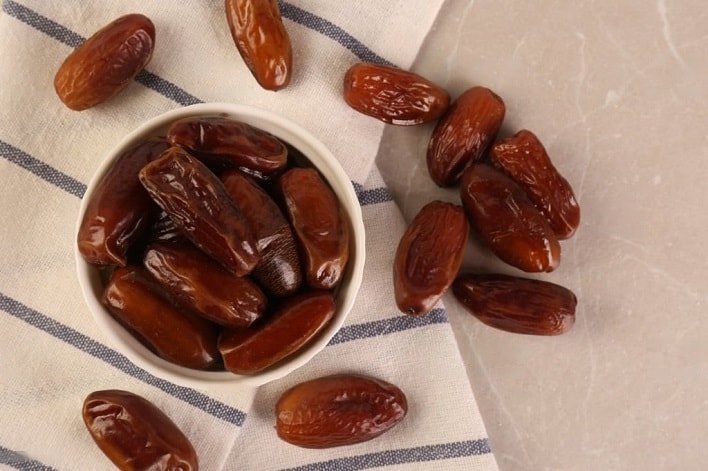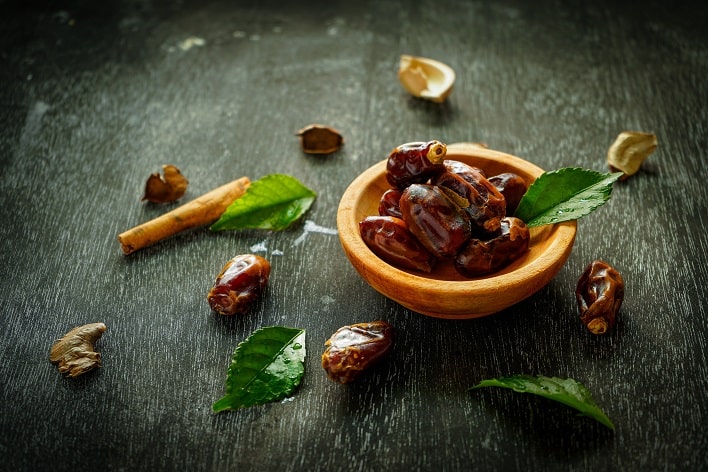
Dates, a delectable and naturally sweet fruit cherished throughout history, offer an array of extraordinary health benefits. This in-depth exploration will delve into the diverse ways dates can boost our well-being. Primarily, dates are a rich source of essential nutrients, making them a nutritional powerhouse.
Dates, a delectable and nutritious fruit cherished for centuries, offer a wealth of health benefits. Rich in fiber, potassium, and antioxidants, they can positively impact various aspects of well-being.
In this article, we will explore 10 remarkable health benefits of consuming dates and offer tips on incorporating them into your diet.
Whether you seek to enhance heart health, boost energy levels, or improve digestion naturally, dates present an excellent choice.
What are dates?

Dates, scientifically known as Phoenix dactyliferous, are the fruits of the date palm tree and belong to the Arecaceae family. They have a rich history of cultivation in the Middle East and North Africa for thousands of years. These oval-shaped fruits vary in size, color, and taste based on ripeness and variety.
With their natural sweetness and abundant nutrients, dates have been a significant dietary staple in their native regions. They are relished when fully ripe, offering flavors ranging from sweet and caramel-like to rich and nutty. Additionally, dried dates are widely available worldwide, ensuring a longer shelf life.
Beyond being enjoyed on their own, dates are a versatile ingredient in various culinary creations. From being included in desserts and baked goods to savory stews and sauces, dates elevate the taste and nutrition of numerous dishes. Furthermore, they are used to make date syrup, date paste, and date sugar, serving as wholesome natural sweeteners for a wide range of recipes.
The nutritional richness and potential health benefits make dates not just a delicious treat but a valuable addition to a well-balanced diet.
Nutritional Value of Dates
| Nutrient | Amount per 100g |
|---|---|
| Calories | 277 kcal |
| Carbohydrates | 75 g |
| – Sugars | 66 g |
| – Dietary Fiber | 7 g |
| Protein | 1.8 g |
| Fat | 0.2 g |
| – Saturated Fat | 0 g |
| – Monounsaturated Fat | 0 g |
| – Polyunsaturated Fat | 0.1 g |
| Cholesterol | 0 mg |
| Sodium | 1 mg |
| Potassium | 656 mg |
| Calcium | 64 mg |
| Iron | 0.9 mg |
| Magnesium | 54 mg |
| Vitamin C | 0.4 mg |
| Vitamin B6 | 0.2 mg |
| Vitamin K | 2.7 µg |
Please be aware that the nutritional values may slightly vary based on the specific type and ripeness of dates. The provided table offers a general understanding of the nutritional content present in sweet dates. With their natural abundance of sugars, particularly fructose and glucose, dates are an excellent energy source. Additionally, they are packed with vital minerals like potassium and magnesium, along with some vitamins, making them a delicious and nutritious snack option.
Nutrient Content of Dates
1. Carbohydrates and Sugars: Dates are rich in carbohydrates, primarily in the form of natural sugars like fructose and glucose, providing a quick and efficient source of energy.
2. Dietary Fiber: Dates are a valuable source of dietary fiber, supporting digestion and aiding in regulating bowel movements.
3. Protein and Fat: While dates contain small amounts of protein and fat, they are not significant sources of these nutrients.
4. Minerals: Dates are packed with essential minerals, including potassium, calcium, iron, and magnesium, which play crucial roles in various bodily functions.
5. Vitamins: Dates contain important vitamins such as vitamin B6, vitamin K, and trace amounts of vitamin C, contributing to overall nutritional benefits.
6. No Cholesterol or Saturated Fat: Dates are naturally cholesterol-free and have negligible amounts of saturated fat, making them a heart-healthy choice.
7. Low Sodium: Dates have very low sodium content, which is advantageous for individuals who need to monitor their sodium intake.
It’s important to consider that the nutritional values of dates may slightly vary based on the specific type and ripeness. Overall, dates are a nutrient-rich and delightful addition to a balanced diet, offering natural sweetness and a variety of essential nutrients. However, due to their high natural sugar content, it’s advisable to consume them in moderation, particularly for individuals with diabetes or those aiming to manage sugar intake.
The Benefits of Consuming Date

Incorporating dates into your diet can bring about a multitude of health benefits, thanks to their abundant and diverse nutritional profile. These sweet and delectable fruits offer a host of advantages that can positively impact various aspects of your well-being. Let’s explore some of the remarkable benefits of consuming dates regularly:
1. High in Nutrients:
Dates are a treasure trove of essential vitamins and minerals crucial for overall health and well-being. They boast a rich supply of potassium, magnesium, calcium, vitamin B6, and iron, which play vital roles in supporting various bodily functions.
2. Good for Digestion:
With a notable dietary fiber content, dates are beneficial for digestion, promoting regular bowel movements, and helping to prevent constipation.
3. High in Fiber:
Dates’ high fiber content contributes to a feeling of fullness, aiding in weight management by reducing hunger pangs and controlling appetite.
4. Improve Brain Function:
Packed with antioxidants such as flavonoids and polyphenols, dates may play a role in supporting brain health and protecting brain cells from oxidative stress.
5. Improve Bone Health:
Dates offer valuable minerals like calcium and magnesium, essential for maintaining strong and healthy bones, making them beneficial for bone health.
6. Reduce Blood Pressure:
With low sodium and high potassium content, dates can help regulate blood pressure and promote a healthy cardiovascular system.
7. Improve Eye Health:
Dates contain eye-friendly carotenoids like lutein and zeaxanthin, which contribute to better eye health and may reduce the risk of age-related macular degeneration.
8. Boost Energy:
Thanks to their natural sugars, such as fructose and glucose, dates serve as a quick and efficient source of energy, making them an ideal pre-workout snack.
9. Reduce Cholesterol:
Emerging research suggests that dates’ fiber and antioxidant content may aid in lowering LDL cholesterol levels, thereby supporting heart health.
10. Weight Loss:
While dates are calorie-dense due to their natural sugar content, they can still be included in a healthy weight loss diet when consumed in moderation. The fiber in dates promotes satiety and helps control appetite, supporting weight management efforts.
Enjoy the health benefits of dates by consuming them in moderation as part of a balanced diet. Their natural sweetness and nutrients can enhance your overall nutrition while avoiding excessive calorie intake. Savor the delightful taste of dates and reap their many health rewards.
Are dates safe for everyone?
While dates are generally safe for most people when consumed in moderation, several considerations should be kept in mind:
1. Allergies: Although rare, some individuals may have allergies to dates or other fruits within the same botanical family (Arecaceae). If you experience symptoms such as itching, swelling, or difficulty breathing after eating dates, it is essential to consult a healthcare professional to determine if you have an allergy.
2. Natural Sugars: Dates are naturally high in sugars, particularly fructose and glucose. While this makes them an excellent source of energy, individuals with diabetes or those managing their blood sugar levels should exercise caution and monitor their intake. If you have diabetes or any other health condition, it’s advisable to seek guidance from a healthcare professional or registered dietitian for personalized dietary advice.
3. Fiber Intolerance: Dates are rich in dietary fiber, which is generally beneficial for digestion. However, some individuals may experience difficulty digesting high-fiber foods, leading to bloating, gas, or digestive discomfort. If you encounter such symptoms after consuming dates, you may consider limiting your intake or choosing lower-fiber alternatives.
4. Caloric Density: Due to their high sugar content, dates are calorie-dense, meaning they pack a significant number of calories in a small serving. If you are striving to manage weight or maintain a specific calorie intake, it’s crucial to be mindful of portion sizes when consuming dates.
5. Oxalate Sensitivity: Dates contain oxalates, which are naturally occurring compounds found in many plant-based foods. For individuals with a history of kidney stones or oxalate sensitivity, moderating the intake of high-oxalate foods, including dates, is advisable.
6. Medication Interactions: If you are taking any medications, particularly blood sugar-lowering medications or medications that may interact with potassium (found in dates), it’s vital to consult your healthcare provider to ensure there are no potential interactions.
Listen to your body and consume dates based on your health needs and goals. If you have specific health concerns or dietary restrictions, consult a healthcare professional or dietitian for personalized guidance on incorporating dates safely into your diet.
Date Recipes
Get creative with dates by trying out a variety of delicious and nutritious recipes that showcase the natural sweetness of this versatile fruit. Whether you prefer sweet or savory, there are numerous ways to enjoy dates in your daily meals and snacks. Here are fifteen mouthwatering ideas to tantalize your taste buds and nourish your body:
1. Date Energy Balls: Combine dates, nuts, and your favorite seeds in a food processor, then roll the mixture into small balls. Refrigerate them for a quick and healthy snack on the go.
2. Stuffed Dates: Remove the pits from dates and stuff them with almond or walnut halves for a simple yet delightful treat.
3. Date Smoothie: Blend dates, bananas, milk (or plant-based milk), and a dash of cinnamon for a sweet and creamy smoothie to start your day.
4. Date and Nut Bars: Mix chopped dates, nuts, oats, and honey together, then press the mixture into a pan and bake it for tasty and nutritious snack bars.
5. Date and Goat Cheese Appetizer: Fill pitted dates with soft goat cheese and sprinkle chopped pistachios on top for an elegant and delicious appetizer.
6. Date and Nut Oatmeal: Add chopped dates, nuts, and a drizzle of honey to your morning oatmeal for a delightful twist of flavor.
7. Date and Chicken Tagine: Cook chicken with dates, apricots, spices, and a splash of orange juice for a mouthwatering Moroccan-inspired dish.
8. Date and Spinach Salad: Toss chopped dates, fresh spinach, feta cheese, and a balsamic vinaigrette for a refreshing and nutritious salad.
9. Date and Walnut Bread: Bake a loaf of date and walnut bread for a delightful breakfast or snack option that pairs perfectly with a cup of tea or coffee.
10. Date and Coconut Bliss Balls: Blend dates, shredded coconut, and a touch of coconut oil, then roll the mixture into balls and coat them with more coconut for a tropical treat.
11. Date and Banana Muffins: Incorporate chopped dates and mashed bananas into your favorite muffin recipe for extra sweetness and moisture.
12. Date and Almond Milkshake: Blend dates, almond milk, a scoop of almond butter, and ice for a creamy and satisfying milkshake.
13. Date and Quinoa Salad: Combine cooked quinoa, chopped dates, cucumber, red onion, mint, and a zesty lemon vinaigrette for a refreshing and nutritious salad.
14. Date and Chocolate Dipped Treats: Indulge in a simple yet decadent dessert by dipping pitted dates in melted dark chocolate and letting them cool.
15. Date and Caramel Sauce: Whip up a natural caramel sauce by blending dates, water, and a pinch of salt. Drizzle this delicious sauce over ice cream or pancakes for a delightful treat.
Unleash the culinary magic of dates! Enjoy their natural sweetness in sweet and savory dishes. From Date Energy Balls to Stuffed Dates, indulge in delightful taste and bountiful nutrition. Let your imagination run wild on a mouthwatering journey of culinary creativity!
What are the Benefits of Eating Dates every day?
Regular consumption of dates can offer numerous health benefits owing to their abundant nutritional content. These potential advantages include:
1. Nutrient-Rich: Dates are a valuable source of essential vitamins and minerals, such as potassium, magnesium, calcium, vitamin B6, and iron, vital for overall health and well-being.
2. Digestive Health: High in dietary fiber, dates support healthy digestion, aid in regular bowel movements, and may help prevent constipation.
3. Heart Health: With low sodium and high potassium content, dates may contribute to regulating blood pressure and promoting cardiovascular well-being.
4. Weight Management: The fiber in dates provides a feeling of fullness, potentially aiding in weight management by reducing overall calorie intake.
5. Brain Health: Antioxidants like flavonoids and polyphenols in dates may protect brain cells from oxidative stress and support cognitive function.
6. Bone Health: Dates’ calcium and magnesium content contribute to maintaining strong and healthy bones.
7. Energy Boost: Being a natural energy source due to their high sugar content, dates make an ideal pre-workout snack or midday pick-me-up.
8. Blood Sugar Regulation: Despite their sweetness, dates have a low glycemic index, resulting in a slower impact on blood sugar levels, making them suitable for moderate consumption by individuals with diabetes.
9. Anemia Prevention: Dates’ iron content can help prevent iron deficiency anemia when included in a balanced diet.
10. Improved Immunity: The vitamins and minerals in dates strengthen the immune system, aiding the body’s defense against infections and illnesses.
11. Eye Health: Dates contain carotenoids like lutein and zeaxanthin, which promote eye health and may reduce the risk of age-related macular degeneration.
12. Skin Health: Antioxidants in dates combat oxidative stress and may contribute to healthier skin and improved skin elasticity.
13. Aid in Pregnancy: Dates are a traditional remedy believed to support pregnancy and ease labor due to their nutrients and potential impact on uterine muscle tone.
Consume dates in moderation due to their calorie density and natural sugars. Excessive intake may lead to weight gain and health issues. Consult a healthcare professional or registered dietitian for personalized dietary guidance, considering your individual health needs and goals.
Final Words
When included in a balanced diet, dates are a tasty and nutrient-rich fruit that can provide a number of health advantages. They support energy levels, bone strength, cognitive health, heart health, and digestive health. Because they are high in calories and sugar, moderation is crucial. For individualized nutritional guidance, speak with a healthcare practitioner. For general well-being, include dates in your meals and snacks as a delectable and healthy supplement.
Reference
FAQs- Benefits of Consuming Dates
Are dates good for weight loss, even though they are high in natural sugars?
Dates can be part of a weight loss diet when consumed in moderation. While they are calorie-dense due to their natural sugar content, they also contain dietary fiber, which can help promote feelings of fullness and control appetite. To include dates in a weight loss plan, it’s essential to be mindful of portion sizes and balance them with other nutrient-rich foods.
Can people with diabetes eat dates?
People with diabetes can enjoy dates in moderation, but it’s crucial to monitor their carbohydrate intake and blood sugar levels. The high fiber content in dates can slow down the absorption of sugars, potentially having a less immediate impact on blood sugar levels compared to other sugary foods. However, it’s best for individuals with diabetes to consult their healthcare provider or a registered dietitian to determine how dates can fit into their meal plan safely.
How many dates can I eat in a day?
The appropriate number of dates to consume in a day depends on individual dietary needs, health goals, and overall calorie intake. As with any food, moderation is key. Eating 2-3 dates per day can provide the health benefits without significantly adding to overall calorie intake. However, if you have specific health conditions or are concerned about sugar intake, it’s best to consult with a healthcare professional or dietitian for personalized advice.
Are dried dates as nutritious as fresh ones?
Dried dates are generally as nutritious as fresh dates, but the drying process may concentrate some nutrients, including sugars and calories. Dried dates also have a longer shelf life and are more convenient for storage and snacking. However, dried dates may lack the water content found in fresh dates, so it’s essential to stay hydrated if consuming dried dates.
Can dates replace sugar in recipes?
Dates can be used as a natural sweetener in recipes, replacing refined sugars in some cases. To use dates as a sugar substitute, blend them with water to create a date paste or puree, which can be used in baking or cooking. However, it’s important to note that while dates offer additional nutrients, they are still high in natural sugars, so moderation is necessary when using them as a sugar replacement.
Also Read
- What is Ursolic acid? Benefits, Side effects and Supplements
- 5 Best Ingredients to Increase Testosterone Levels Naturally
- 6 Benefits of Biotin – How It May Protect Your Health
- Keto Diet Advantages And Disadvantages
- Planning Meals: 4 Factors To Consider – Complete Guide
